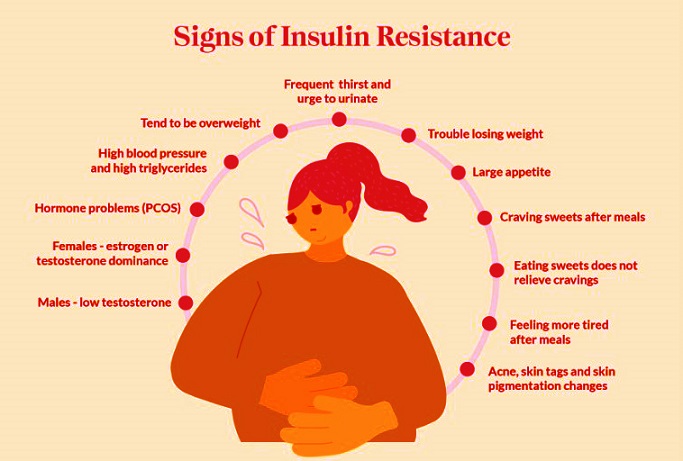Nikhil Prasad Fact checked by:Thailand Medical News Team Nov 17, 2024 4 months, 3 weeks, 4 days, 19 hours, 8 minutes ago
Medical News: As the COVID-19 pandemic continues to unfold, new research highlights a startling link between the virus and metabolic disorders. A study conducted at the "Victor Babes" University of Medicine and Pharmacy in Timisoara, Romania, reveals how COVID-19 can trigger insulin resistance, even in individuals with no prior history of diabetes. This development sheds light on the long-term metabolic consequences of the virus, raising concerns for millions of COVID-19 survivors worldwide.
 COVID-19 causes insulin resistance in non-diabetic individuals
COVID-19 causes insulin resistance in non-diabetic individuals
The research team focused on understanding the relationship between long COVID-19 syndrome and metabolic disruptions. This
Medical News report aims to make their findings accessible to a wider audience, emphasizing the risks associated with the virus's lingering effects.
The Study: Design and Key Findings
This prospective observational study included 143 non-diabetic individuals who had tested positive for SARS-CoV-2 between January 2020 and December 2022. Participants underwent evaluations at the time of hospital admission, and follow-ups were conducted four and twelve months later. Researchers measured fasting glucose, insulin, and C-peptide levels using intravenous arginine stimulation tests, along with body mass index (BMI) and inflammatory markers like high-sensitivity C-reactive protein (hs-CRP) and erythrocyte sedimentation rate (ESR).
Key findings from the study include:
-Insulin Resistance and Long COVID:
Approximately 30.7% of the participants developed long COVID-19 syndrome.
Of these, 75% exhibited insulin resistance and eventually developed diabetes within one year, compared to 55.8% of those without long COVID-19.
-Impact of Obesity:
Among obese participants (BMI > 30 kg/m²), 62% experienced elevated blood glucose levels a year post-infection.
Surprisingly, obesity rates did not differ significantly between those with and without long COVID-19, suggesting that other factors, such as chronic inflammation, play a pivotal role.
-Inflammatory Markers and Metabolic Disturbances:
Elevated hs-CRP and ESR levels correlated with insulin resistance, highlighting the role of inflammation in disrupting metabolic health.
However, the triglyceride-glucose (TyG) index, another marker of insulin resistance, showed weaker correlations, pointing to the complexity of the underlying mechanisms.
Chronic Inflammation: A Central Culprit
The study underscores the role of chronic inflammation in the development of insulin resistance among COVID-19 survivors. Prolonged activation of the immune system, potentially triggered by viral remnants or autoimmune responses, can interfere with insulin signaling. This disruption leads to poor glucose absorption by cells, resulting in elevated blood sugar le
vels.
The virus's ability to infect pancreatic beta cells, which are crucial for insulin production, exacerbates this problem. By binding to ACE2 receptors on these cells, SARS-CoV-2 can impair their function, causing a decline in insulin secretion. This interplay of inflammation and cellular damage creates a perfect storm for the onset of metabolic disorders.
Implications for Public Health and Patient Care
The findings highlight the urgent need for healthcare systems to prioritize monitoring metabolic health in COVID-19 survivors, especially those with long COVID-19 syndrome. Routine screenings for insulin resistance, glucose levels, and inflammatory markers could help identify at-risk individuals early, enabling timely interventions.
For patients, adopting a healthier lifestyle becomes more critical than ever. Weight management, regular exercise, and a balanced diet can help mitigate the risk of developing insulin resistance and other metabolic complications.
Future Directions in Research and Treatment
The study opens the door for further investigations into the molecular mechanisms linking COVID-19 to insulin resistance. Understanding these pathways could pave the way for targeted therapies to prevent or reverse metabolic damage. Potential treatments might include anti-inflammatory drugs, insulin-sensitizing medications, and advanced glucose-lowering therapies like SGLT2 inhibitors and GLP-1 receptor agonists.
Moreover, ongoing trials, such as the DARE trial examining dapagliflozin's efficacy in hospitalized COVID-19 patients, may offer insights into how existing diabetes treatments can benefit long COVID-19 sufferers.
Conclusion
This research highlights a concerning connection between COVID-19 and insulin resistance, even in individuals without prior metabolic conditions. The long-term implications of this link extend beyond the immediate health crisis, signaling a potential wave of diabetes cases in the years to come. As healthcare providers and researchers grapple with these findings, a comprehensive approach addressing both respiratory and metabolic health will be crucial.
The study findings were published in the peer-reviewed Journal of Personalized Medicine.
https://www.mdpi.com/2075-4426/14/9/911
For the
COVID-19 News, keep on logging to Thailand
Medical News.
Read Also:
https://www.thailandmedical.news/news/the-silent-impact-of-insulin-resistance-on-health
https://www.thailandmedical.news/news/metformin-emerging-as-new-treatment-for-fibromyalgia-as-study-links-insulin-resistance-as-the-cause
